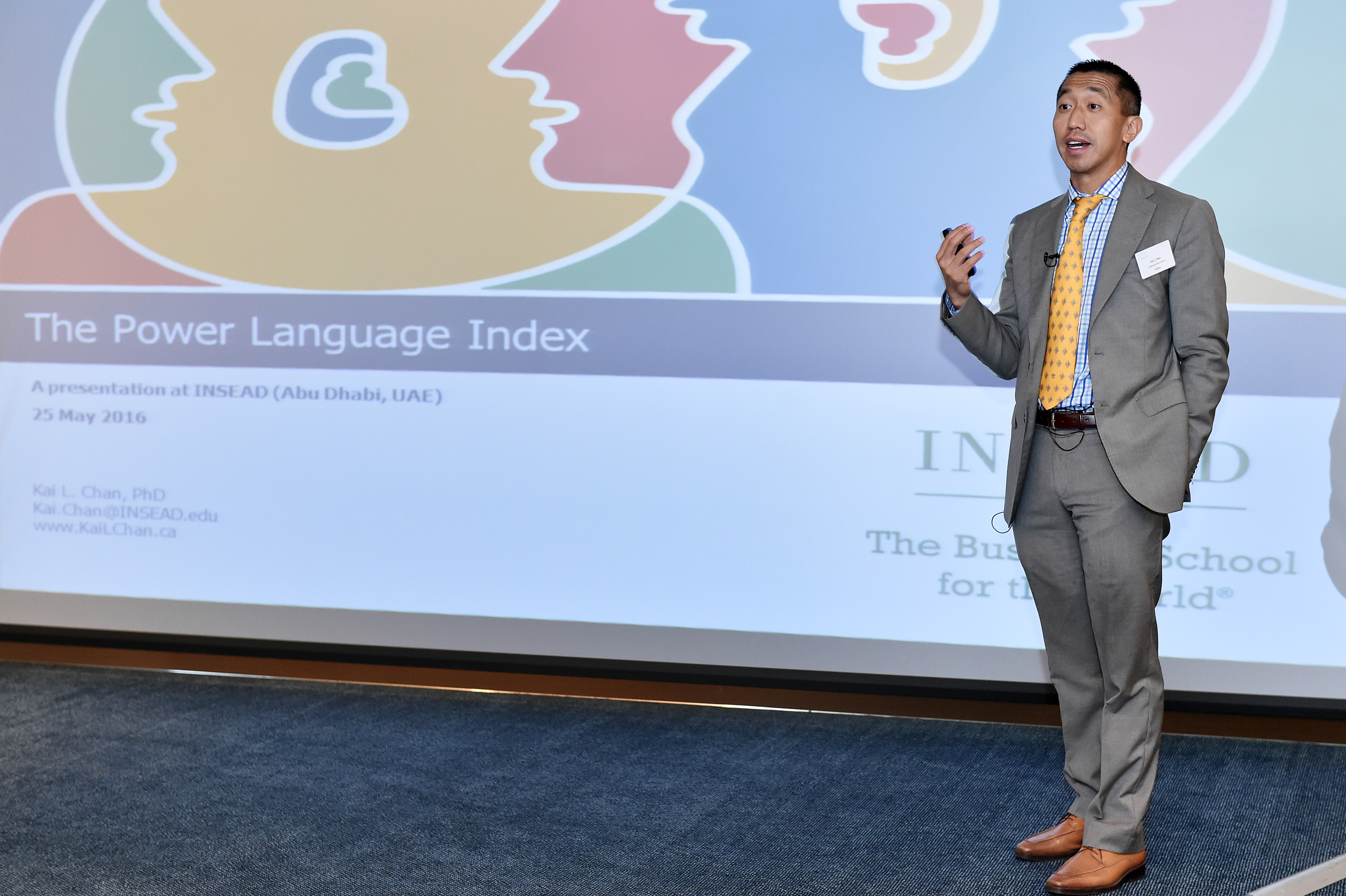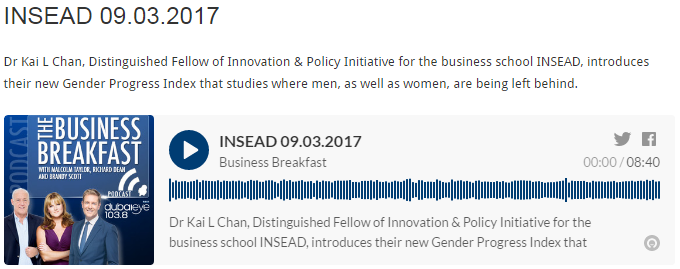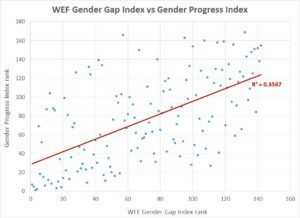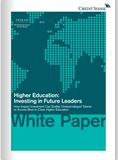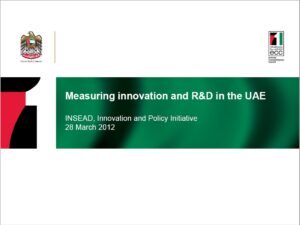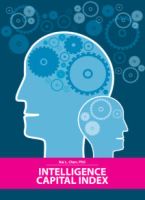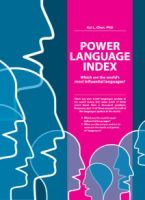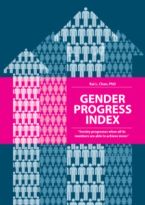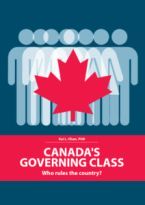I am a Distinguished Fellow at INSEAD (Innovation & Policy Initiative). In this role I collaborate on scholarly research and support the institution’s academic commitments.
This page is a collection of my scholarly works done at INSEAD.
**********
INSEAD bio:
Dr Kai L. Chan
Distinguished Fellow, INSEAD Innovation & Policy initiative
Dr Kai L. Chan is a Distinguished Fellow at INSEAD Innovation and Policy Initiative. He is also part of the senior management team of a Montreal-based technology (cloud software) company.
Previously Dr Chan was a special adviser to the UAE federal government on competitiveness and statistics, where he focused on that country’s positioning on global performance indices. He was also a member of the Dubai Expo 2020 bid team.
Prior to moving to the UAE in 2011, Dr Chan served as an associate and the in-house economist for a consumer finance merchant banking firm in Manhattan. Before that, he worked in the Singapore office of a global management consulting firm with assignments in Asia and Europe covering risk management and strategic planning for banks.
Dr Chan’s expertise/research cover education, income distribution, migration, government & policy, and performance measurement. He is the creator of the Power Language Index, Gender Progress Index, and Intelligence Capital Index. His works and analysis/commentary are often covered by the media.
Dr Chan holds an undergraduate degree (BSc) in economics & mathematics from the University of Toronto, and graduate degrees (MA, PhD) in economics from Princeton University, where he wrote his doctoral dissertation on monetary policy. He has taught courses in economics, mathematics and statistics at Princeton, the University of Toronto and Concordia (Montreal).
Kai grew up in Toronto, Canada, but currently resides in Montreal. He speaks English, French, Cantonese, Mandarin and German, and is currently learning Russian. He enjoys playing (ice) hockey, training mixed martial arts (Muay Thai and jiu-jitsu), gastronomy and travelling in his free time.
**********
I am a guest lecturer at the University of Hong Kong in their School of Professional and Continuing Studies. The below are the titles of my lectures as part of their executive education course: “Managing public services in the transitional nature of Bangladesh: Institutional integrity, sustainable development, and advanced technology applications.”
- AI and inequality: How smart machines exacerbate demographic bias and inequality
- Policy workshop on advanced technology applications: Innovations and policy initiatives
- Policy workshop on advanced technology applications: Policy cycles, implementation gaps, and case studies
- Bangladesh’s competitiveness landscape: Competitiveness and positioning of Bangladesh in global performance indices in the 21st century
**********
I spoke at the Asia Global Institute (Hong Kong University) on 11 Jan 2019. The title of the talk was “AI & Inequality: How Smart Machines Exacerbate Demographic Bias & Inequality”.

AGI LECTURE: AI AND INEQUALITY: HOW SMART MACHINES EXACERBATE DEMOGRAPHIC BIAS AND INEQUALITY
Date: Friday, January 11 2019, 1230 – 1400
Venue: Asia Global Institute, MB 328, 3/F Main Building, HKU
How does AI generate riches, redistribute wealth and distort the labour market in multicultural societies? How will AI distort off-shoring and upend the traditional development model? As AI displaces humans from their jobs, economic value will be transferred from labour to capitalists, particularly the ‘super-elites’. In an era where capital is mobile while labour is less so, AI will exacerbate already-high levels of inequality if left unmanaged.
**********
INSEAD Knowledge (26 December 2018) article about which countries have the most efficient education sector

The Countries Getting the Highest Return on Education
Read the article here.
**********

I spoke at the University of Aruba at their “Home Languages & Higher Education” symposium (19-20 Sep 2018). My talk was on the Power Language Index and an assessment of the language dynamics in Aruba, where the island operates seamlessly in four languages (Dutch, English, Papiamento and Spanish). Papiamento is the majority language and along with Dutch is an official language of the island. However, only Dutch has status in official/government interactions and schooling is almost universally in Dutch. Given its geography, Spanish is also widely known/spoken. English is the dominant language for tourism and is globally powerful. Applying a modified version of the Power Language Index to the language scene in Aruba we arrive at a language hierarchy with English at the top, even though it has no status on the island.
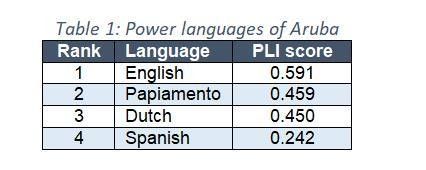
The presentation can be found: here.
**********

I spoke at KU Leuven at their symposium on “Internationalisation of Universities and the National Language” (4 May 2018). My talk was on the Power Language Index as it pertains to the dominance of English in the sphere of scholarly research (and thus the challenge of universities from the non-anglophone world that must work in English to be relevant and competitive on the global stage).
**********
INSEAD Knowledge (12 July 2017) article about the Intelligence Capital Index
The World’s Smartest Countries
Read the article here.
**********
INSEAD Knowledge (22 May 2017) article about the Power Language Index
The World’s Most Powerful Languages
Read the article here.
**********
INSEAD Knowledge (20 April 2017) article about the Gender Progress Index

A New Global Measure of Gender Progress
Read the article here.
Business Breakfast interview (INSEAD 09.03.2017)
Dr Kai L Chan, Distinguished Fellow of Innovation & Policy Initiative for the business school INSEAD, introduces their new Gender Progress Index that studies where men, as well as women, are being left behind.
Copyright © 2017, Arabian Radio Network. All rights reserved.
International Women’s Day
I spoke at the Abu Dhabi INSEAD campus’s International Women’s Day event (8 March 2017). The subject of the talk was the Gender Progress Index.
Dr. Kai L. Chan, Distinguished Fellow, Innovation and Policy Initiative at INSEAD presented the Gender Progress Index that takes a holistic view towards gender issues. The conference featured several women leaders in the Middle East who have made a significant contribution to the region and society.
TÉLÉ MATIN (27.12.2016)
L’espagnol, de plus en plus influent, menace le français
La langue de Molière bientôt détrônée par la langue de Cervantès. L’espagnol sera bientôt plus influent que le français. L’échéance serait pour 2050.
Business Breakfast interview (INSEAD 11.10.2016)
Economist Kai Chan from INSEAD has been researching which is the world’s most powerful language – and its smartest country. The results might not be what you think. Brandy Scott and Malcolm Taylor ask the questions on the Business Breakfast.
Copyright © 2016, Arabian Radio Network. All rights reserved.
IIPI Policy Breakfast Series – May 2016
The Power Language Index – The Most Influential Languages in the Word
Speaker:
Dr. Kai Chan, Distinguished Fellow at INSEAD Innovation & Policy Initiative (IIPI). Dr. Chan is also an advisor to the UAE federal government on national competitiveness and statistics.
Wednesday, 25 May 2016
INSEAD Middle East Campus in Abu Dhabi, 08.30-10.30am
The Power Language Index – The Most Influential Languages in the World
A rigorous assessment of the efficacy of language in geography (travel), economy, communication and diplomacy. (Does language predict the outcome of the global elite?)
*The Policy Breakfasts are a series of early morning seminars that focuses on current policy issues through the lenses of academics and practitioners in industry and government. The series is aimed at professionals concerned with government policy.
Gender Progress Index
Mao Zedong once remarked that “women hold up half the sky.” Yet in many countries today women are not fulfilling their potential due to cultural, legal and social impediments. But just as society loses when women fall short, so too when men are stifled. Society progresses when all its members are able to achieve more.
The Gender Progress Index (GPI) is a measure of female-male progress that considers both the level of progress as well as the gap between the two. Levels are important as a country where people are equally under-utilised is not ideal. The gap is important as it indicates the internal gender dynamics within a country. The GPI also takes an agnostic view on female-male outcomes: male under-performance of female outcomes is equal to the inverse.
To capture both the significance of levels and ratios into an index a measure can be defined using both level and ratio as inputs: y = f (L,R). This can be done using a Cobb-Douglas utility function with constant returns to scale: y = (L^0.5)*(R^0.5) where L is the unit-free score derived from the level values (a distance-to-frontier function) and R is the ratio of female-to-male or male-to-female value of the indicators, where the ratio taken is the one that is less than or equal to 1. The Cobb-Douglas utility with constant returns to scale (and with parameter alpha = 0.5) has many nice mathematical properties that makes it a robust index function. Full details on the methodology can be found here.
Below are the ten countries with the best gender progress. These are the countries that are best at achieving the full potential of their country:
- Norway (0.698)
- Sweden (0.685)
- Netherlands (0.659)
- Denmark (0.649)
- Finland (0.648)
- New Zealand (0.646)
- Iceland (0.645)
- Germany (0.642)
- Canada (0.638)
- France (0.637)
An executive summary of the Gender Progress Index can be found below:
The Gender Progress Index is a wholly different perspective on gender issues than that of the WEF Gender Gap Report (or the Gender Inequality Index published in the HDR). The WEF Report is focused on the gap that women face relative to men, whereas the Gender Progress Index looks at the gap and the level, and is constructed to be robust to gap “improvements” derived from deterioration in male values. Moreover, the GPI believes that male shortcomings are just as bad as female shortcoming as in either case society loses when half is population (for the most part) is not realising its potential. So it should come as no surprise that they yield highly different (albeit still related) results. The chart below shows the Gender Gap Index rank (x-axis) versus the Gender Progress Index (y-axis).
The full report can be found here.
Intelligence Capital Index
The key qualities of a nation that will spur innovation and propel the knowledge economy are smarts and creativity. Underpinning these is the “intelligence capital” of a country, a measure of its knowledge capability, i.e. its stock of intellectual know-how along with its ability to develop and attract talent. The Intelligence Capital Index (ICI) is a way to measure the ability of countries to capitalise on the knowledge economy by assessing their environments for education, creativity and talent attraction. It is based on five aspects of knowledge acquisition/production: (1) Quantity of education; (2) Quality of education; (3) Average educational skills; (4) Elite educational skills; (5) Creativity and complexity; and (5) Attractiveness and openness to talent. Underlying these are 24 indicators that span the life cycle of talent — from childhood through tertiary education and then in the marketplace.
Below are the ten countries with the best knowledge capital outcomes:
-
- USA (74.883)
-
- UK (64.192)
-
- Germany (64.179)
-
- Australia (63.960)
-
- Singapore (63.599)
-
- Sweden (61.582)
-
- Switzerland (61.574)
-
- Canada (61.149)
-
- Finland (60.445)
- Denmark (60.252)
A synopsis of the ICI can found below:
Full results (128 countries are assessed) including methodology and indicators can be found here.
Power Language Index
There are over 6,000 languages spoken in the world today, but some 2,000 of them count fewer than a thousand speakers. Moreover, just 15 of them account for half of the languages spoken in the world. Which are the world’s most influential languages? The Power Language Index is a measure of a language’s efficacy by measuring its influence in 5 domains (“opportunities”): (1) geography, (2) economy, (3) communication, (4) knowledge & media, and (5) diplomacy. Within each of these opportunities is a set of indicators, totalling 20 in entirety for the index. The index is a cardinal measure with a range [0,1].
Below are the ten most powerful languages:
-
- English (0.889)
- Mandarin Chinese (0.411)
- French (0.337)
- Spanish (0.329)
- Arabic (0.273)
- Russian (0.244)
- German (0.191)
- Japanese (0.133)
- Portuguese (0.119)
- Hindi (0.117)
English is by far the most powerful language, and is over twice as strong as its closest rival (Mandarin Chinese) and eight times as effective as the tenth most dominant language (Hindi).There are many interesting consequences and insights from the index. For example, in spite of being the second largest contributor to both the IMF and UN budgets, Japanese are highly under-represented in senior positions in either institution, and Japanese is not even an official language of the UN. (UN budget contributions by German-, Italian- and Portuguese-speaking countries also surpass contributions of Arabic- and Russian-speaking nations (which are official UN languages).) On the other hand, French, which counts just 80 million speakers is the third most powerful language and an official language of all of the world’s major supranational organisations. And the global elite (e.g. Davos attendees) does not mirror the world either by population or economy or even the number of billionaires. Rather, the global elite is an English-speaking group to the detriment of countries where English proficiency is low.
The full report can be found by clicking the icon below:
Below are links to the presentation shared at INSEAD as well as a summary of the presentation on INSEAD’s webpage.
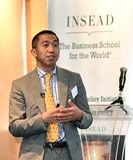 The Power Language Index
The Power Language Index
The Most Influential Languages in the World
There are over 6,000 languages spoken in the world today, but a third of them have fewer than 1,000 speakers; 15 languages are spoken by half of the world’s population. At the May Policy breakfast seminar, Dr. Kai L. Chan examined the efficacy of language in geography (travel), economy, communication and diplomacy.
**********
I contributed as a peer reviewer for a work by my colleagues at INSEAD (Abu Dhabi) on the challenge of opening access to talented underprivileged students from least-developed countries to elite centres of higher learning in developed countries. The project was sponsored by Credit Suisse.
White Paper: Higher Education – Investing in Future Leaders (Mahroum & Al-Saleh, 2015)
How impact investing can enable underprivileged talents to access best-in-class higher education
**********
The new economic norm: jobless growth
The WEF, through its Global Agenda Council (GAC), identified “persistent jobless growth” as one of the top 10 trends of 2015.
A draft comment by me on the jobless growth and the role of automation can be found here: “Jobless growth — the new norm in developed markets.”
*********
An article from Forbes.com:
October 19, 2014
Big Data and the death of passion
By Shellie Karabell
We live in the “information age” – perhaps too much information – and the consultants are having a field day telling us how to handle it all.
“It may not be possible to overstate at this point how important Big Data analytics could be to the business world… what may look like a revolution is really an evolution,” writes David Meer, a New York-based retail sector partner at Strategy& (formerly Booz & Co, now part of PwC) in the company’s online magazine, Strategy & Business. He calls it “the next frontier of a trend toward greater data-driven decision-making that began with the adoption of mainframe computers for business use in the 1960s.” Those, you may remember, were the days of manual typewriters, mimeograph machines, and the Post Office.
Meer contends that companies which can use this data in their business decisions will “significantly outperform” their competitors and enter into a virtuous cycle of continuous improvement. The missing link between being snowed under by facts and figures and the optimum output is the “high-value business questions that new sources of data and more powerful analytics can help them solve.” In other words, we have the answers… now we need the questions.
Meer elaborates on his research and findings in his chapter for the World Economic Forum’s 2014 Global Information Technology Report (GITR), and proposes a four-step “Big Data maturity framework” to help companies formulate the high-value propositions or questions in order to take advantage of the promise Big Data brings:
1. Performance management – leveraging key performance indicators such as financial reporting, compliance monitoring, and performance measurement;
2. Functional area excellence – more efficient marketing and logistics;
3. Value proposition enhancement – personalized experience with which customers can positively identify, leading to retention and cross-selling;
4. Business Model Transformation – creating data-centric business models.
Point four may contain the answer to why businesses are not yet embracing Big Data as the basis for decision-making: leaders are not willing to give up their gut instincts and intuition. In the past, it was in vogue to disparage focus groups; today it’s Big Data.
BUT WAIT.
Other researchers postulate that “our economic system had been fuelled by ‘ignorance is bliss’ just as much as by information” since the dawn of capitalism and that there are significant downsides to fully incorporating Big Data into business decision-making.
Sami Mahroum and Kai Chan from INSEAD’s Innovation & Policy Initiative, in an interview for this blog, said that there is a lot of excitement about the prospects of so-called Data Driven Innovation, where Big Data will not only make our decisions but also drive our cars and fly our aeroplanes. The reality is more complicated than that. More information can actually negatively affect our economic lives.
To wit, the loss of tens of millions of jobs in the OECD region alone (i.e., most of the Western economies), citing the OECD’s own statistics which suggest increased efficiency and productivity growth resulting from employing Big Data of between 5% and 10%, resulting in up to 7-million possible new jobs… but – more significantly – a loss of 53.5 million current jobs. Those job losses, Mahroum points out, run across the employment spectrum, from the factory floor to white collar jobs such as sales and marketing. The cost of ameliorating that disruption would be significant to business as well as to taxpayers.
“Too much information will lead either to decision paralysis or to risk aversion,” says Mahroum. “Human beings cannot process so much information and they will eventually deploy bias in selecting the type of information they want to learn about… what we call ‘deliberate ignorance’.”
Mahroum contends that capitalism has been operating under a healthy level of ignorance since the beginning of modern economic theory. Adam Smith spoke of the “miracle of the ‘invisible hand’” – a metaphor for “hidden market dynamics that bring about a socially optimal outcome when self-interested agents (“businessmen”) in a market try to maximize their personal benefits.” Their corollary is Albert O. Hirschman’s “hiding hand principle” – the hidden troubles that lie ahead of the entrepreneur embarking on new or risky ventures, entailing significant costs before executing a U-turn and heading back to the beginning for a new go at the venture.
Chan concurs, noting that the 2001 Nobel Prize in Economics went to three American economists, including Columbia University’s Joseph Stiglitz, for their “analyses of markets with asymmetric information,” postulating that the value created in capitalist systems occurs under conditions that can be characterized as “giving the benefit of the doubt.” Princeton’s Chris Sims called the phenomenon “rational inattention” – selective inclusion and rejection of information in decision-making – and not to be confused with sheer laziness.
“The Hidden Hand and blissful ignorance lead many entrepreneurs and people in general to embark on all sorts of journeys where we fail and we win but ultimately we learn and accumulate lots of knowledge in the process,” says Mahroum. In other words, to paraphrase an age-old adage, if you look, you might never leap.
In providing too much information, could Big Data be heralding the death of “strategic risk?” What happens to the concept of learning from your mistakes? Or to the kind of entrepreneurial passion that propelled Steve Jobs to go ahead with the iPhone because he believed he could and should create blockbuster products people didn’t yet know they wanted? What happens to progress and human development and the passion which is ultimately at the core of any successful venture, when the answers are all there, up front?
Coming up with the right value-proposition questions to rationalize the information contained within Big Data – as Strategy&’s Meer suggests – is probably key to capitalizing on this new phenomenon, and the kind of work involved in working backwards from the answers will take some time and a lot of corporate soul-searching. Mahroum cautions, “We don’t expect Big Data to reveal everything, but we are arguing that there is a strong element of exuberance about it that can lead some leaders in business to delay decisions or make the wrong ones.”
Then there’s the sports theory of the “intangibles” – that unquantifiable force you won’t find in the play sheets or statistics – call it passion or the desire to win – which can shift the whole match.
Who would have signed the Declaration of Independence knowing fully what struggles lay ahead?
Copyright © 2014 Forbes.com LLC™. All Rights Reserved.
Original article: http://www.forbes.com/sites/shelliekarabell/2014/10/19/big-data-and-the-death-of-passion/
*********
IIPI Policy Breakfast Series- March 2012

Competitiveness and Innovation at Work in the UAE
Guest Speakers:
- H.E. Mr. Abdulla Nasser Lootah, Secretary General, Emirates Competitiveness Council
“Competitiveness and Innovation at Work in the UAE”
- Dr. Kai Chan, Senior Advisor, Emirates Competitiveness Council
“Measuring Innovation and R&D in the UAE”
Wednesday, 28 March 2012
Abu Dhabi Campus, 08.00-10.30am

